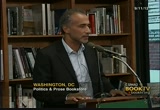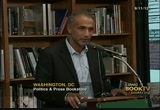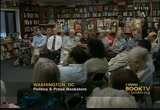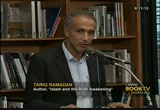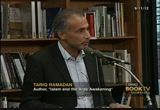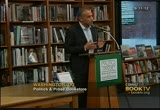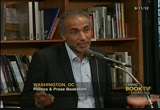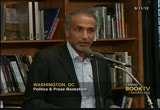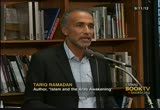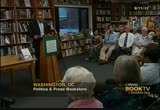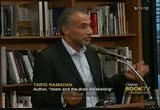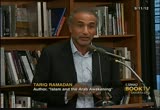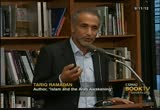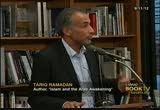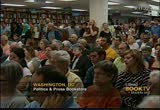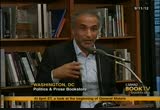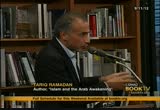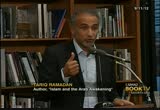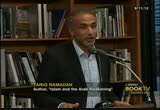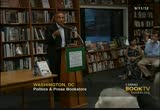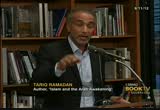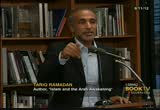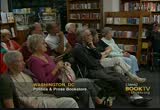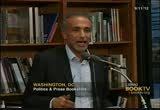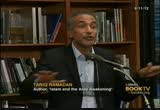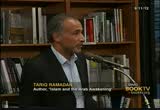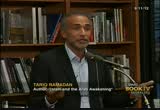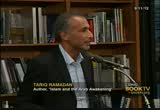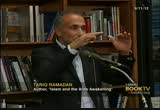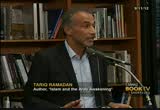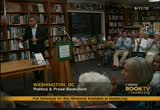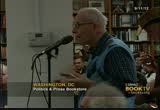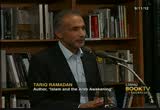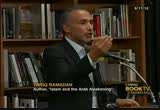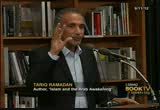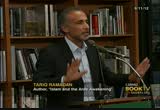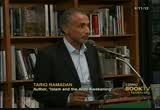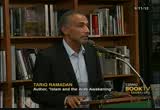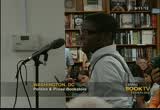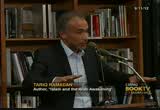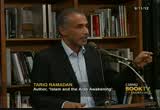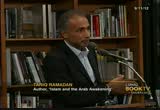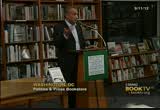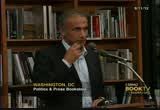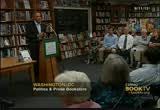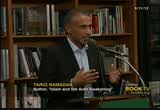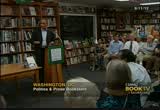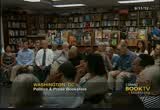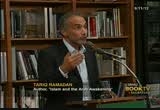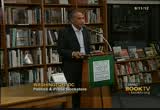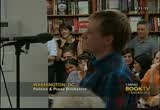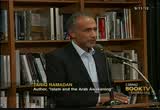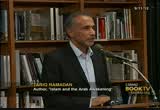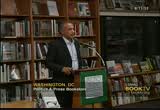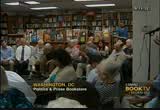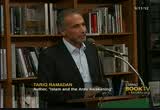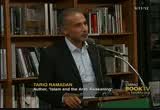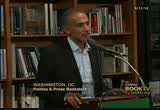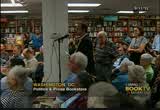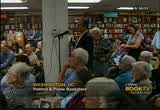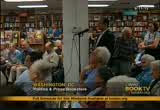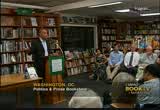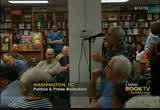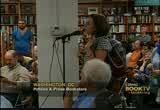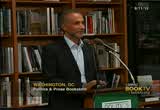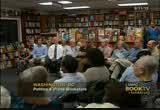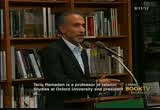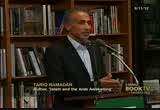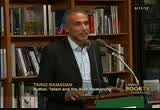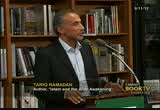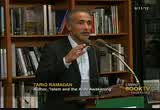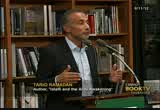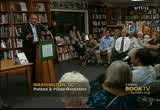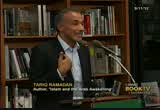tv Book TV CSPAN September 16, 2012 3:00pm-4:15pm EDT
3:00 pm
which chronicals the life of a woman kidnapped at the age of 11 and held captive for 18 years by a convicted ray pis and his wife. you can find more on the best sellinger by going to "new york times." com and clicking on arts. president of the european muslim networking talks about the causes behind the arab spring and the role he thinks islam will play in the future of the countries. now on booktv. it's just under an hour. ..
3:01 pm
>> what are the challenges ahead when it comes to democratization in the middle east in the future. having said that and many this very date where we were thinking about what happened in this country, once again after september 11th but, in fact, much before, but after september 11th we had the perception in connecting islam to violence and to terrorism and violent extremism. it's the right time to speak about not a tiny minority that is killing, but massive demonstrations of people in egypt and tunisia and in syria asking for dignity, justice and freedom. these are also muslims. so it's the right answer to talk about millions as a response to a tiny minority of people that
3:02 pm
are not representing islam for the great, great, great majority of muslims around the world. so it's also an answer that we have to get from within the muslim countries. having said that, when i started writing the book, i was trying to get a sense of what was happening. and, of course, i started to deal with the facts. was it true as it was said that what happened in tunisia was the self-immolation of muhammad, we didn't know anything about what was happening in tunisia, in egypt, and we were caught by surprise. and by studying the fact it's quite clear that this is not the real picture of the whole process. in fact, years before -- and, in fact, we didn't take seriously what the president bush was saying in 2003 when he was saying we want democracy in the middle east.
3:03 pm
he said that when he was talking about iraq, but, in fact, he meant it. and we sometimes are not -- we didn't really listen to bush reducing his statements to the perception we had of him, forgetting that he's representing a system. he's representing an administration. and this administration was pushing and is still pushing for many reasons, and not only political reasons. anything which has to do today with democratization in the region. and the bloggers, the cyber dissidents who were pushing and spreading around this feeling that something should change in egypt and in tunisia and even in syria or in yemen, many of them, these bloggers, were trained much before, and this was known. google, freedomhouse, other institutes they were training people and financing the
3:04 pm
training of people who were advocating democracy and liberating the countries. and they were trained by american organizations, european organizations. and if we were to study what happened in eastern europe whereas the whole process of what was called european spring, the eastern european spring, we can see there was behind this a philosophy. no ones has heard and not enough people have heard about sergei popovych who was the one mind who was getting this sense of how do we mobilize the people in order to push for massive demonstrations in the country? so the fact that this was not known is strong fact. on the other side, it was all organized from -- [inaudible] is wrong as well. there is, you know, i am very far from the conspiracy theory, but i don't want to be naive, that it came from the people of all of a sudden the western
3:05 pm
governments where they're so happy to see the people being democrats in egypt while for three decades they were supporting the dictator themself. what they did with egypt, with benghazi, with so many dictators, they were supporting them because it suit at that time the strategic interests and the economic interests. so the point for me was to deal with this and to be very cautious with wording. i was not buying from the very beginning this perception, oh, it's the arab spring, these are revolutions. i started by saying let us be cautiously optimistic. something is happening which is great. and what is great is what i call in the book and in the title the awakening. and the awakening is the awakening of the arab mind and the intellectual revolution with people understanding, yes, it's possible to get rid of dictators, it's possible to change the country. this is irreversible. that cannot be chaingd.
3:06 pm
and this is something which is a legacy, a shift which is very promising for the now and for the future. now to speak about revolutions that are achieved and i don't know, i still don't know. so i don't know today if what is happening in egypt is an unfinished or an unachieved revolution. i don't know what is happening with what is happening in tunisia that we are, we can be very, very quick in defining. revolutions take time, we have to be cautious and try to understand that many dimensions has to be considered. and these dimensions are not only political. our obsession with the political apparatus, the political dimension is making us forgetting the economic factors and the geostrategic factors. and there will be no democracy in the region if we don't have economic stability. so to open up the countries, to open the markets through democracy is something that we
3:07 pm
knew and know in africa. it happened before. so to now to deal with the arab world as if we were just, oh, we're very happy these people are for justice, dignity and freedom, and we don't care about which kind of political/economic policy, which kind of new positioning they will get in the global economy, something which is very naive, and we have to be very cautious with this. so this is where i'm dealing with the network knowledgey at the beginning of the book and being cautious about this. look, be careful, it's something that is not as easy, and at the same time saying something happened which is an intellectual revolution if i have to speak about revolution, i will say it's an intellectual revolution, it's a mindset that is changing, and we have to come with this and to hope that the new generations are going to start from there with something which is new. this is the beginning of the book and also saying that, you know, to tell us, for example,
3:08 pm
that mubarak or ben ali didn't know about what was happening with the youth, it's wrong. many people were arrested under the mubarak regime because they were trained in the west, and when they came back, they were arrested. so they knew something was happening. even the american ambassador in cairo sent a note to the american government staying there are young people -- saying there are young people who want to get rid of the mubarak regime. so this was in 2008, three years before. so we were not aware of what was happening, but so many analysts dealing with the issue were saying egypt is going to implode because the situation, the economic situation, the socioeconomic situation, corruption, unemployment, poverty, they were there and exactly the same in tunisia. so we have to look at the whole dimension with a bit more critical take on what was said and the way it was covered by
3:09 pm
the media. this is one. the second thing that i am trying to analyze in the book is the discussion and the way we were looking -- and we are still looking at the the arab countries and the muslim countries. and i was analyzing and trying to get the sense of the debates there. there is something that we still have now. and what we have now is the discussion about the polarization in the debate. it's as if we reduce everything in the arab world between the secularists and the islamists. so that's it. if you want to understand the political landscape there, you have progressive sick lahrists and backward islamists. so this is it. and i think that it's not only coming from the west. this is the problem. when e -- when i visited tunisia and when i was dealing with people in algeria or egypt, we have this polarization.
3:10 pm
and the polarization's not coming from a perception from abroad, it's something which is happening from within in the arab world itself. and this is a problem, why? because at the end of the day, this polarization is not only misleading, it's making the political debate very superficial. because you end up talking to secularists, and they explain that, oh, they justify the political presence by saying, you know what? we are the progressive. we have universal values. and these people are backward, reactionary and religious people, and they want to impose a theocracy. so their justification about the political presence is we are against them. so it's a justification by and through the opposition. and you go to the islamists, and they have exactly the same position. we are the guardian of the islamic tradition, and these people are westernized. they come with the ideas of the wes, and we are resist -- west, and we are resisting their influence. so we have on one side people
3:11 pm
justifying the political present through the opposition of, by the opposition to the islamists, and islamists being the guardian of religion justifying the presence and the political role by resisting westernization. and that's it. what is your answer to the main problems that we have within the society, in egypt or tunisia? what is your social policy? what is your educational policy? we don't have answers. the only thing is these people are dangerous. polarization is reducing the political discourse into something which is very simplistic. and not only the arab world is falling into that trap, but we in the west, we read the situation through this lens. and by saying, okay, you know what? egypt is in danger. why? too many women are wearing the head scarves now. [laughter] so the symbol becomes the true dynamic within the society. and you can laugh, but i am
3:12 pm
sorry to tell you in the media coverage, it's too many. too often the case that we are reducing the reality of a country on head scarves, symbols. how many women and how many men what is your position on sharia, and even though if you don't know the definition of sharia, if you use the term, it's over. [laughter] so that's the reality of the position we have. but once again what i'm saying to the muslim countries in the arab world, you cannot blame the west to reduce the political discourse to this because this is exactly what is happening in the muslim countries themselves. this is the problem. so by going beyond in this, polarization is in, and we have to go beyond this and come with the true questions that we have to face. and this is the second part of the book. what i'm trying to tackle the way forward, what are the critical questions that we have. we have at least five main areas where we have to deal with
3:13 pm
critical questions, and they are not simple. remember ten years ago when -- [inaudible] came in turkey, many people were say, oh, he's an islamist, he's going to impose sharia. after ten years no one is talking about imposing or implementing shah arena in turkey because he said i'm a muslim-democrat. as much as you are having people being christian and democrats, and they are christian democrats. and it's not a contradiction in terms. at least on one side. now we acknowledge the fact that what happened in turkey is not a contradiction in terms. why? because he is respecting the secular system, working from within and saying i'm a democrat with islamic reference. and then at the same time trying to promote a rule of law within the country to work against corruption and more transparency and not even imposing respecting the constitution and the laws
3:14 pm
that were implemented and being very successful on the economic side. so no one today is talking about the islamists that are implementing sharia. and what was said about turkey, by the way, i'm saying this without idealizing. i'm quite critical of some of the decisions and some of the visions and only of the -- some of the policies that are implemented. i am critical. and when i was asked about, you know, what is happening in egypt, say is turkey the model, i say there is no good model. even the united states of america is not a model if you are serious about freedom, dignity and also the power of the state. because i'm ready to talk about -- i will come to that point about separating, you know, the state from religion. but if you separate or distinguish the state from religion, tell me what you put instead of religion. because what we are facing in the west now -- and we all know this as citizens -- i live in
3:15 pm
europe, you live in the united states of america, and we all know that the problem that we have with our democracies now is not the dramatic decision of religions, but some magic decisions of transnational corporation and economic power that are deciding without us being able to think anything. and we call it democracy, we're still today dealing with powers that are beyond the democratic procedures. the banks, transnational corporations. and we are facing with people who are deciding. for example, in greece, in spain, in italy we have technocrats who are coming to solve the problem. we never elected them, but money is chosing them. so we also have to deal with not simplistic answer when it comes to separate religion from state, what do you have? directing the state or imposing decision on the state which is also imposing decision on us as
3:16 pm
citizens. so o this idealization of the western democratic models, i would say be cautious. we all have to deal with problems and crisis from within, so i wouldn't push the arab world to follow blindly the western model, but to be very critical and to try to take the better, the best from other model and to try their own way. having said that, five main problems, and i will stop here. the first one is really the discussion about the nature of the state. and what i am saying -- i was referring to erdogan. erdogan avoided referring to islamic state. and if you listen now to what is coming from tunisia and what is coming from egypt, they don't speak about, and they don't talk about islamic state. they are talking about civil state with islamic reference. [speaking in native tongue] this is what they are saying. so it's a civil state 12k3-6789 the civil state means that religion is now going to impose
3:17 pm
a framework and a structure. having said that, that's all fine. are we playing with words, or are we now really talking about something which is the state is a bottom-up delegation of power and religion, she's coming from on high, and it has no power on the decision of the states. what is coming from the new islamists and even, you know, some sociologists are saying this is no longer islamist, this is post-islamism. i don't know even when islam is started now, i don't know when it's ending. but we are -- we have some, you know, problems here with terminology. they are referring to islam, and there are critical questions that we have to ask when it comes to the prerogatives of the state in which we are dealing with the principles. and my point here is to say the muslim-majority countries should be quite clear on six main principles that, for me, are not negotiablement the first one is
3:18 pm
rule of law, the second is equal citizenship for all, all the citizens. all the citizens. muslims and people of other faiths or with no faith at all. so this is something which equals citizenship, it's important. the third one is universal suffrage. it's a majority process. the fourth one is accountability. when you are elected, you are elected for a while. you have to come back to the citizens to be checked, not to be democratically-elected for life as we had with the son and the family. so this is what we had with the arab world before. the fifth one is separation of authority, judiciary, legislative, executive as we know. and differentiating the state from religion when it comes to power. meaning by this it's not because you are separating, that you're divorcing the two sphere. for example, when you talk about
3:19 pm
this in france, they are laughing at you and saying we are the only secular society. the united states of america is not a secular society because the way you are, you have, you know, you can't say in francaise god bless france. you can't say this. that's mixing everything, that's confusing everything. even though you can think about it, you can't say it. [laughter] but the point is, the relationship is important. in islamic-majority country the people could be separating without divorcing. and i am very serious about this by saying atheists or religious people, christian or jews or muslims or buddhists, i would like from our philosophy and our religious traditions to put more ethics in politics. so it's not imposing religion, but it's having a reference in ethics. ethics, you know, to separate religion from power doesn't mean
3:20 pm
you don't have ethics in politics. so which can -- what could be a reference, it's a very deep discussion. we have limits when it comes to freedom of expression, odds, and, you know, all the dug that we have now in -- discussion in due meese ya. so this is one, this is about the state, a very important discussion that we need to have. and we have now the islamist groups, but also the secularists sometimes they are not beyond this. because e was peace -- i was facing some secularists, and they were always justifying their position by being against islamists. you are politically democrat. some of the secularists were supporting dictators for years, some of them. so they were selling to the west, we are progressive, we are against the religious imposition.
3:21 pm
but they were supporting the mali they were supporting -- [inaudible] because some of them were resisting. so we have to be very cautious not because you are religiously liberal that it means you are going to support the six principles that i was mentioning now. and i think on this we have to get answers from all the political actors in muslim majority countries. the second field is a very important one about the economic vision for the future. because if you look at the islamists today, there is something which is quite clear, they are all accepting the free market and the system. erdogan himself, he is now making better, you know, when the e.u. didn't want him and didn't want turkey, he said, okay, you will see. it might be now, but e.u. is much more in need of turkey than turkey as you see it. and it's a very important point. why? because he is doing very well on the the economic side.
3:22 pm
is in the answer? do by want the market to be open, and that is what we mean by democratization, or do we want economic stability? my point here is that the first steps to go to the imf, to the world bank and to enter within the system could be a problem in the future. and we know that islamists are not a problem with the west as long as they are neoliberal and capitalists. >> care about the status of women in saudi arabia, in saudi arabia now coming or in qatar or in older monarchies because they
3:23 pm
are protecting our economic interests. so you can be a conservative there, you can ban women from driving cars as long as you are protecting our oil and our economic interest. so at the end of the day, they are islamists, they aren't saying there is no democracy in islam, but they have the right take on economy. we have to be serious about this. because at the end of the day what is coming from the islamists now is that they are not resisting the economic power, they are not resisting the transnational corporation, they are ready for it. it might be that this is the point that because they are ready, we can deal with them. there is another thing that is important, and this is why i am saying about the arab awakening, if we keep not talking about the economic challenges, we are misled in the whole discussion. and my take on this is what is happening in the middle east is not for political reasons. i don't think that the -- i'm
3:24 pm
sorry, the obama administration or the european administrations are more happy with democracy than they were with dictators as, you know, i think it's a question of interest. but what are the interests now? over the last ten years, the chinese economic presence in the middle east was multiplied by seven. it's a very powerful presence. and the brink -- bric countries, brazil, india, china, russia, turkey, are playing a very important role, and we don't talk about this. there is a shift here, and for many reasons it's going to have an impact on the countries, on the relationship between israel and the other arab countries because, remember, china has not the same relationship to israel than the united states of america. so this is a very big concern, what is going to happen in the
3:25 pm
region. we have to take these seriously. it's not only political, it's economic. and geostrategic. so this is a second point which is the answer. the economic vision coming from the arab world. when i was talking to the current president in tunisia, i was with him recently, and he and he say, no, i don't have a problem to deal with islamists as long as they deal with the rule of law and transparency. my main problem with them is not that they refer to islam. my main problem with them is their take on the liberal economic system. they are ready for that. so this is my problem. he's a secular, but he has a problem with the islamists because they are very, very conservative on religious terms and very liberal on economic terms. it's the same with the muslim brotherhood, as you know, recently dealing with the world bank and imf. second thing. third thing is about education.
3:26 pm
very quickly, we need to have discussion. there will be no change if we don't work on education. i mean education for all. education means, also, to struggle against poverty. instead of having jihad against enemies, it's jihad for education which is something which is essential. and this is what i'm saying about women. i, you know, i was talking about, you know, head scarf in the streets. i'm sorry, the only way you are going to evaluate and to assess empowerment of women in muslim authority countries is on two things. it has nothing to do with the way they dress. it has to do with access to education and, the second, access to the job market. this is where we want people to be, and the secularists and muslims are not coming with answers that are credible and efficient in this way. so this is a big question, what is your educational policy? in which way are you going to invest and to promote something which is also to reassess the religious way, the teaching of religion in the society.
3:27 pm
and on this it's going to be a big problem. we have two challenges on this field. the divisions from within between the sal my, the literalists. the fourth one about culture. and i think that arabs and muslims are not taking this seriously. we are facing a world culture that is very much penetrating every sector within the society. and if you look at the arab world, we have a problem. the arabic language, arabic literature, the books, it's the creativity. where are the arabs when it comes to movies, when it comes to art, when it comes to entertainment, when it come to a democracy? it's not about rules only, it's not about rights, it's about feeling good. it's about producing something which is us, our perception of the world. s where is that?
3:28 pm
who is promoting this? it's a challenge. it's a very big challenge. we have to talk about art, we have to talk about beauty. it's part of the democratic thing. et has to do with freedom, it has to do with aceps of belonging within the society, and i think that it's neglected in our discussion. and the last one which is a field that is coming out of all this process is something that's covering the whole thing, the way we deal with corruption. because it's the starting point and the end of the whole process. corruption is one of the main challenges in the arab world at all the levels, by the way, because you deal with ordinary citizens say look at these people, they are so corrupt, but the daily corruption that we experience in the arab world is something that we all know. so we have to deal with this, and this is ethics. ethics of citizenship, ethics of civil society, ethics everywhere, and this is the way i would say islam could play a role as being an ethical reference not by closing and being a framework where we can't
3:29 pm
just think, but being a reference where it gives principles and objectives and help the people to do something which is the future. having said that, my last point is let us all together celebrate the principles, the six principles that i mentioned, celebrate this shift, this mindset, this intellectual revolution by saying one thing which is important. at the end of the day, we are promoting shared universal principles, but it's not about us deciding for the people which kind of democratic models they will have in the future. this is their business. for the egyptians to fight their political model that is referring to their history, their collective psychology, their culture, they need to find a model. it's not for us to go to iraq and to tell the people this is the only right democratic model that you need, because we know how it should be. it's not.
3:30 pm
this is imperialist, this is still colonization, this is intellectual imposition. let the people find the model, let us be part of the discussion. and this is why i'm in europe as well, and i'm sharing this with you because i think that all of us here as citizens, we have a role to play. by being critical about our own experience as democrats and as citizens. by seeing in our society the failures, the undermining process of us being citizens and seeing people deciding for us by saying we have to be critical and at the same time to be very clear on anyone who is not advocating violation, but advocating freedom, dignity and equal rights that ha -- has thet to be part of the political discussion in the arab world. it's not for us to say you are the good democrat or the good muslim or bad muslim. this is, once again, not going to help anyone in the future. thank you. [applause]
3:31 pm
>> i enjoyed your talk very much. what i would like you to do is to talk more about, um, bringing women into running of things. because it seems to me that most of your religions, for instance, have male idols and, you know, in the leading role. and, um, it wasn't until, you know, 1920 that women got the vote in this country. so if you don't let them in, they just don't seem to have much influence. but if you do let them in, you get a different vision from the male. the males got a load of
3:32 pm
testosterone, and it's behind all the wars that we've had. it's behind a lot of the troubles that we had, the crime and stuff. so if you put the women in, you're going to get a different viewpoint. i would like you to comment on that. >> i completely, i completely agree with your conclusion. i would be more cautious about the biological explanation. [laughter] but the serious point here is really about women being much more involved. and i completely agree with this. you know, we have to be serious about this, and we have to rely on facts and figures when it comes to when a society is doing well. if you look at all the facts and figures when it comes to education and when it comes, for example, to agriculture, when it comes to every dimension of being efficient when you allow the women to be involved, they are doing better than men.
3:33 pm
the facts are here. it's in agriculture, it's in education. not only in muslim countries, not only in the global south, look at what is happening in the west. we have now women and muslim women being involved in education at the same level as men. the figures are clear, they are doing better than men, and this is creating even problems within the muslim communities in the west because now they are more educated and more efficient. so i would say that having -- and starting with this as a principle, it's very important to try to find a way to promote women. and i would say don't be misled by the superficial vision of what is happening in the muslim--majority countries. the uprisings, women are very much instrumental in tahrir square, in tunisia. they were there. even in saudi arabia you have women now very much educated and being more and more visible. the point is to promote this visibility through education and
3:34 pm
job opportunities and to get them not as symbols. be careful with symbols that are betraying the reality on the ground. but i think this is where we have to come together. but what i would like for us in the west is not to say the only liberated women are the women like us. no, the liberated women are liberated women when they think, when they are autonomous, and they can be practicing muslims and liberated women. we have to reassess our perception of who is free and how they are free having started by this, we try to have a critical discussion, but i agree this should be done, and it also should be done in the way we agree with the forces. i advocated one chapter on women and saying we have two problems; reduction of the text to the literal understanding and
3:35 pm
projection of culture on the text so the cultural understanding and we have to deal with this. it's a critical challenge that we have here. >> i spent about 90 minutes before you got here looking through your book, checking out various things through the index. and on one page, i don't know whether it was 81 or 131, you seem to say that there's no way that democracy can take root in the middle east unless the palestinian problem is solved. and my question is, does that mean it will be israel's fault if democracy fails in the various countries? [laughter] >> it's good with your question, i always agree with the first part and not with the conclusion. [laughter] i said this. and let me put it clearly. very often the arabs and in the middle east, they are explaining all the problems that they have in the middle east by saying, you know what? israel is the reason. so you.com to the conflict that all our -- you come to the
3:36 pm
conflict that all our problems are from israel. and i'm saying the opposite. israel and the problem we have with our lack of support towards the palestinians is a consequence of many other problems. so it's a consequence. and the causes of all this is that if you are serious about all of this, the challenges are there. but i am not naive. by saying remember what israel said when the people were demonstrating in tahrir square saying we have to support mubarak. because there is a problem here that the majority of the people are not going to be happy with israel policy w the palestinians and the israeli government. they know that. so if you want to deal with democracies in the middle east, you better reassess israel policy towards the palestinians.
3:37 pm
and this has to be solved. i'm not saying it's the cause, i'm saying it's the critical discussion that we have in the middle east and what is happening in syria, what is happening in many countries around has to do with the palestinian. so my point is to say that israel -- and i said it many times, and it is one of the causes why, in fact, i was banned from this country by saying the united states of america should stop to support unilaterally israel because with israel is not -- because israel is not doing a good service to freedom, dignity and respect of people in the region. this is my point. i stick to this, i repeat this, and can i'm not trying to say that israel is to be blamed for this, but if we want to go to achieve something which has to do with transparent democracy in
3:38 pm
the middle east, we have to solve the conflict in a way which is respecting the rise and the dignity of palestinians. >> sorry, it sounds like double talk. >> no -- >> you know what? i -- no, no, no. i'm very sorry you end like this. you know the answer to all the people who are saying i'm having double talk, i'm just responding you might have double hearing. [applause] [inaudible conversations] >> good evening, professor ramadan. thank you for your talk. my name is edris evans, i'm with the international policy group, and my question pertains to syria. how do you characterize the ongoing conflict there? recent news reports have characterized it as an emerging sectarian conflict. um, do you think that it is a
3:39 pm
conflict defined primarily in opposition to the government of president assad, or do you believe it's a more emerging sectarian conflict in the region? >> look, when i was writing, you know, on my web site i was trying to write every week an article about what was happening. for eight months the u.s. administration and the west were not really supporting a change in syria. you remember that for eight months they were asking bashar al assad to reform his regime from within. this was coming from european countries and coming from the states. at one point it was quite clear that the massive demonstrations were not to be controlled. so something has to be done because the people are not happy with him. and then they change because today had to deal with who can we trust in the op o decision. we have some who are very much against the american administration. so they took eight planets to
3:40 pm
try to find people they can trust. so, and the russian government and the chinese government, they didn't like what was done in libya where after the non-fly zone, this was used to enter, and they were completely dismissed and just nowhere in the libyan picture because now it's divided between the states, qatar, the united kingdom and france. so the starts point is really much about politics and gee o yo strategy -- geostrategy. what happened afterwards is that all the reading of these political challenges were read in sectarian mode. and by saying, and, you know, in my web site and even when i wrote the book, i got so many criticism and insults coming from muslims saying, in fact, you support the resistance because you are sunni, and you
3:41 pm
like the qatar i/saudi monarchies. and on the other side people who are from the shia tradition saying we support bashar al assad because he's a supporter of, you know, palestinians and at the same time the shia tradition. and it became something which is a sectarian reading of the whole thing. and i think it's very dangerous. i allocated one south carolina in the book about this divide between shia and sunni by saying it's one of the great challenges of our coming years because i don't want see enough scholars, i don't see enough intellectuals, i don't see enough public figures and people being ready to say shia and sunni, we are miss limbs altogether -- muslims altogether, and we have to stick to some principles. it's not because he's supporting
3:42 pm
shia for dictator. bashar al assad is dictator, and just based on principles, we have to get rid of dictatorship, and he has to be removed and find a way in syria. but i would say exactly the same thing about bahrain. all the people who felt was done, you know? these are shia against sunnis, so we have to accept what's happening. i'm sorry, that's not right. it's not because the people are sure that it's right for sunni to oppress them. so we have to stick to principles and to come to shared principles that we have but not playing intra, you know, religious divisions that is now happening in the middle east. and it's going to have important control between lebanon, syria, iran and all the other countries in the petrol monarchies. and some are playing a very, very nasty role in the whole thing. in sabia, qatar they're playing
3:43 pm
with this now, and some scholars are playing with this. and i'm sorry, i think that we have to be courageous, to say that's not acceptable. that's not acceptable. we have to stick to principles against the dictators, whoever they are, and for freedom for whoever are the people. [applause] >> mr. ramadan, the essence of democracy is popular sovereignty and protection of minority rights. given those principles, why should we have any optimism whatsoever about the creation of democracy in muslim-majority countries where god is sovereign and where these countries have an abominable history of oppression of religious minorities for centuries and where that oppression is
3:44 pm
evidenced today in a list of countries; saudi arabia, iran, egypt, iraq? that's enough, yes. >> okay. look, i think that we have to be very cautious not to take examples in history as defining religion or civilization. because if i was to do this with american civilization, i wouldn't trust it. >> oh! >> [inaudible] >> that's a whole different topic. >> sorry? >> no. no. >> i'd be delighted to debate our history of religious liberty as opposed to those in the countries i have listed. please, compare them, and i'll i'll -- you'll see a tremendous difference. >> can i answer? just ask the native more thans about the way -- native americans about the way they were treated. but that's not the point.
3:45 pm
the point is, we have to be intellectually fair and equipped when it comes to dealing with history and not to reduce history to what happened and what we can see now. because in the arab world for centurieses, the jews and the christians were much more respected than they were in europe if you are serious about history. just look at the middle ages where europeans had to learn. but the point is, why should we trust now -- the arabs. i'm not asking you to trust, i'm asking you to be objective and to check, and to check what could be done if now you decide that the arabs, because they are muslims -- they're not going to respect minorities, that's over o. just send them dictators. but if now you get it that from within the islamic tradition you have a very long tradition of dealing with diversity,
3:46 pm
respecting people from other place and opening up, if you think that this is possible, what i'm asking you is not to blindly hope, but to critically support. and this is what i'm trying to do. so when you ask me why should i trust, i say, no, don't trust blindly. but, please, don't project onto them prejudices that are coming from very old, wrong perceptions about the other. that's the only thing i'm asking. >> except my examples were very modern. >> sorry? [applause] >> i don't think you addressed my, the modern examples i gave. the modern examples i listed, saudi arabia -- >> i, i didn't say, i didn't say that -- >> [inaudible] [inaudible conversations]
3:47 pm
>> go ahead. >> good evening. you mentioned -- >> [inaudible] [laughter] >> okay. we have seven people, ten minutes. >> you mentioned -- >> where are the women? [inaudible conversations] >> you can stand up. go ahead, please. >> okay. good evening. you mentioned accountability in your speech. i want to talk about iran. three years ago the people attempted to rise up, the regime came in, cracked down, murdered, raped, terrorized and the attempt at revolution failed, unfortunately. why in the light of what you said, why do you work for press t as an iranian state broadcaster? >> that's a good point. if you read the book, you will see that i'm very critical about what happened after the election. and saying, in fact, the uprising started in iran we heat
3:48 pm
people and -- with elite people and students and the way they were oppressed and repressed and tortured sometimes is unacceptable. my take on iran is exactly the same as my take on any country. it's not black and white. within press tv you have two different currents; you have teem who -- people who are conservative and people who are reformists. and when i was talking with people, i took three months to decide if i was going to work. and i went there for two reasons. the first one is the sudanese scholar working with a shia country. i'm not going to accept anyone who is telling you because you are sunni, you don't get there. i want to be a voice where we have a dialogue from within, and this is very important. so it's something which is an internal discussion that i want to have with shia. the second is that if you, if you watch my programs that i have every week, you will see the type of, the angle from which i come to the discussion
3:49 pm
and also hoping and helping the reformist tradition. it's not because, you know, we have a very demonized perception of iran, that we have to reduce iran to one trend. in iran we have people who are working from within, and they are doing a very good job. i am on their side. i'm on the side of the people who are resisting the dogmatic, conservative trend and opening up towards more open view on democracy. and i think sometimes you have to be there and not to compromise. and you will see something. i'm also in qatar, working there. and many people -- you are not asking about qatar. but qatar is also on political terms problematic. if you read the book, you will see that i'm very critical. i will not compromise on principles. but being in qatar by being critical on the way they can deal and in iran by being critical, it's for me the way you deal with people from within that are supporting your principles, and there is something that i will never do.
3:50 pm
it's demonizing people in plaque and white. i -- black and white. i never when i was lapped of this country -- banned of this country, i never confused the bush administration with the american people. if i would have done this, it would have been a catastrophe for the americans. so i think we have -- no, it's serious. it's serious. why, for example, to go on cnn and people who are working and promoting the american perception because you know what they are doing in the world? so it's by being critical, by sticking to your principles. so no black and white political position. but stick to your principles. >> whatever makes you sleep at night, you still work for mass murderers. >> oh! >> sorry for the long answer. okay. [inaudible conversations] >> yes. thank you, professor ramadan. i am glad that you are able to be with us tonight. my question for you relates back to a comment that you made
3:51 pm
earlier today in which you mentioned that the arab revolt, the arab awakening as you call it is not about us. you know, we tend to be somewhat, i guess people in any country tend to view anything as evolving around them, and i know the arab awakening is not about americans or people in europe in particular, but at the same time if you could deliver to president obama or to a member, you know, a leader in europe sort of a one or two-minute sort of, um, policy position as to how they could create a consistent position across countries whether you're talking about egypt, syria, bahrain in terms of encouraging these progressive currents we've seen over the last 18 months, um, what exactly would you say to them? thank you. >> in one minute. [laughter] i would ask for three hours. anyway, look, i think that there is only one thing that i want to say to any inside government. it's really be consistent with your principles.
3:52 pm
this kind of selective approach when you support dictators sometimes, you support democrats sometimes, and, in fact, the only thing that is important for you it's your short-term interests. this is something which at the end is going to act against you. this is counterproductive. so i think the american government, you know, people who are very happy with obama being elected, now they are quite disappointed with what was not done. but at the end the united states of america, they have a very bad reputation in the arab world. and it's wrong sometimes, but sometimes it's right. the way they are dealing with people, the way they are neglecting people. and i'm sorry, you know, when you read the newspapers and you watch tv, you have a sense that the blood of arabs is less valuable than the blood of americans. and if a civilization is getting this sense, there is something wrong. that you have to value the blood
3:53 pm
of people. you have to value innocence of the arabs as much as you value the blood of innocent americans. so i would say to the president become consistent with your principles and support more the people, less the armies even in egypt. and be consistent with israel and the palestinians and be consistent with anything which has to do with transparency and corruption in the muslim-majority countries. consistency is the answer. >> thank you, professor. >> thank you. >> um, i'm trying to synthesize a quite complex idea here. i must say that i welcome you here, i welcome your ideas, and i am also not from the united states of america, i'm from the caribbean, the french/dutch
3:54 pm
caribbean. and i must say i suppose in the latter ideas, we share certain things. but the first thing i would like to talk about is the arab awakening and the issue of the revolution of the arab awakening. how i does, how do you see -- you know, in my opinion the way this is seen and even talked about here tonight is way too simple, and i think you tried to decon truck that way of -- deconstruct that way of thinking. what i'm seeing is an attempt by people in the periphery going back to in my beloved caribbean the haitian revolution. you know, of people trying to -- yes. people trying to resist what is going on and trying to find constantly new models for the change of the world. you have talked a lot about this. i would like to know maybe some ideas of certain more people inside, you know? for the alternatives to what you've talked about where we are at this point in time.
3:55 pm
i'm sure there's some arab intellectuals and stuff like that who have talked about some vision of arab democracy, arab economic policy. that's the first thing. the second thing, the second idea -- no, the second -- it's a question. the second question is important because where i differ with you, where i differ with you is on the notion that if there is a revolt in my part of the world that, and if the revolt goes very, very bad and there's a violent dictatorship there that somehow we should say, well, wait just a minute, let's back off of that. if we can find a way to humanely intervene, and i know this is a horrific problem because there's a lot of things behind that intervention, a ruler who's indigenously evolved and grounded, that's the way i would go forward. >> yes. quite quickly about your questions. the first one i think that i agree with you, and i think that there are lots of intellectuals and mainly among the young
3:56 pm
generations, women and men, that are coming with a vision that is quite interesting and that we have to support. so, you know, after the uprisings we had, you know, scattered -- you know the power and the strength of the movement was they knew that they were against the dictators beyond any political affiliations. the weakness of the whole moment is they don't know why -- what they wanted afterward, and they were standing for what exactly. so i think that they are intellectuals, but still they are trapped into this simplistic polarization very often, and what i hope is to see much more critical discussion. and this is from where we are we can be part of the discussion in a positive way. the second question about if we have to be involved, of course, i think that we have to be involved. now, we have to ask ourself in
3:57 pm
which way we have to be involved because in the case of libya, for example, the way nato was involved and the way it was done i myself was on the bbc and just the day before gadhafi saying we're going to kill the people in benghazi. what do we have to do? i was for a no-fly zone, but i wanted us to do something, and i think today in the syria it's very, very, very, very disappointing to see that we are not doing anything. it's as if we agree to disagree on this and to let it be the way it is with the syrians. so i'm not saying that we have to be pass passive, but we have to be respectful, and we should not intervene only to protect our interests. in libya it was quite clear that this was a deal between the
3:58 pm
united states and france. and i think in syria we have to care about the people who are being killed and not only about the geostrategic interests which i think is the case today. >> i'm a journalist from egypt visiting d.c. and back again to cover the dilemma between the polarization between islamists and civil or secular powers. you said that islamists in egypt say that the -- [inaudible] was religious or islamic background, and this is not the case. do you think that -- [inaudible] into islam and what he wrote can be a solution to this which i think will not be solvent in the upcoming bills we will have still problems. thank you. >> okay. thank you for this question.
3:59 pm
first, what you are saying about the muslim brotherhood and what has been said in the '30s and '40s are right -- >> [inaudible] >> no, let me finish. he was talking about changing the individual and the family and the society and at the end to get an islamic state. and this was to liberate the country toward an islamic state. this is quite clear. if you look at what is happening now within the muslim brotherhood, you cannot say it is the same discourse. you might say they are changing words and having the same intention, but what was said recently even by morsi, he said it clearly, a civil state. he said it publicly. so, no, you have to acknowledge that he said it. now, my main point is not once again, i'm not asking you to trust what they are saying, but when you deal with any political movement, you have to understand that they are dealing with
4:00 pm
pragmatism. erdogan when he was first talking ten years ago, no one trusted what he was doing. is he now changing words and having the same intention? we have just to let the people do what they want to do, and we will check their behavior, not just question their statements. today the muslim brotherhood have changed. yesterday they were not talking about democracy, they are talking about democracy. they were not talking about civil state, they are talking about civil state. it might be a political strategy, it might be. but it also may be because they have change from within. we have to check this on the ground. we can't adjust the side, it's all -- it's exactly the same with people. many leftists that we have today in the west are very much social democrats. yesterday they were trot skies. ..
4:01 pm
-- and he came with good questions and i think that i'm very much in touch with him, i'm reading what he is doing, he has some positions that are questionable from viewpoint and some good questions about the society. about what do we want to do with the muslim society and you can adjust the answer coming from him. the answer coming from a discussion, a critical discussion between his positions and others. he's not only accepting the secularist approach.
4:02 pm
he's critical toward the secularist. i think the only good answer is going to come from critical discussions between the political agents and actors in the society. [applause] so two -- i will take two questions very quickly and then -- [inaudible] you know, can i -- [inaudible] if you can take you and two other women and that's it. good comprise. okay. [inaudible] okay. professor, just a question that is on in the headlines every day the issue with nuclear availability in iron. it seems like it has a life on
4:03 pm
itself that is moving along and i'm troubled by it. >> okay. i take the two other questions and answer the three all together. >> hi. so i talk with them and it turns out we're asking a somewhat similar question. this is to say that i was in egypt for throw and a half years until december 2011, and have the privilege and i call it privilege to have watched the revolution in egypt. it was a privilege to know the democrats anded a vote cans for democratic reform. the followup to this is as i was come together eventing with there's news coming from cairo that is going to be probably quick to be all over fox news today tomorrow and the rest of the week. and that it that is the embassy u.s. embassy in cairo, that they were scaled, that the u.s. embassy. okay. so you know it. apparently the u.s. flag was taken down from the u.s. embassy in cairo and instead a black
4:04 pm
flag with -- there was only one god law and the mohamed is the messenger. and this is scandalous in terms of we see all the democratic reform and we want to believe, we have seen all of this inspiring sort of movement toward democratic reform and you have this. it's going to be all over the news. what would your response to be to all of the thing the pan lick emic coms. how would you mitigate company -- excuse me, sorry. between the freedom of the press and freedom of religion and -- sorry i'm confused by these guys. yeah. freedom of the press, and the respect for religion. the conflict in some ways that's going in the middle east. >> this is one last one. hi, my name is -- i'm a student
4:05 pm
at george washington university. i'm an exchange student from cairo. and my question is basically about, again, being a practicing muslim woman in egypt. we saw the amazing the revolution we inspect the square two months after toward there was at women's right the international woman's day and the women martha day was actually attacked and i understand growing up in cairo and knowing the different cultural ideas related to women, i know that it's going to be hard for that to be worked in during all the things related to the revolution and the idea of civil liberty. but at the same time if we say that session the only thing that is going to help the country change that, is this going to be possible with the muslim brotherhood trying to influence the culture in jipt. thank you. >> so he told me to --
4:06 pm
[inaudible] i go ahead? okay. one more. >> i'll just make it fast. i'm interested in the issue of nonviolence in islam and in some of -- our efforts of [inaudible] that revoting against is not something that is very -- [inaudible] there were some injunction for the prophet that said the muslim should not revolt against the rulers. i want your point of view. [laughter] that's going to be a lot of lecture. but okay. let me start with the first question, which was about iran and nuclear weapons and, i think that we have here two positions. it's one is from within saying we are not doing this, it's not our project, it's about forcible -- and this is what is said by
4:07 pm
the government on the other side. what is said is that it's only for nuclear weapon and the army. i would say here there is something which has to be clear that for me first the position of principle is that anything which has to do with nuclear weapons should be abolished and stopped. not only for iran -- i would say for all the countries. [applause] it's very easy to target iran where just near to iran you have israel, that is not -- we are not talking about it and even the united states of america and the european countries they are lecturing iran why they are having it. and i think that we are to come with a consistent take on the whole issue. now to use what is happening now
4:08 pm
to go as to attack iran as the current israeli administration wants to do, that's not acceptable. and i think that they are trying to do it now in the time where the american administration and the current president is just before the election. anything could happen with the -- [inaudible] i think we are to sigh no to this. to say, you know, i wouldn't even advocate knock already use for even the civil side of things. i'm not supporting this. i will try to find alternative ways of dealing with our need on that. but when it comes to differenting the weapon -- the army is it the way it has to be done in the civilway, i think
4:09 pm
it has to be checks but we cannot launch a war under the terms that we are now. it's not acceptable for anyone but at the same time the right that we are giving to some, we should also ask ourself why there is a lack of consistent in our policy in the region. and this kind of demonization in iran is not helping the region to find solutions. this is one. the second is about what is happening in egypt, and in the -- what was exactly the point you were making is yes. what is happening -- american embassy. and i think that of course is going to be used by the media, it's going to be once again used by people saying look, even know what they are saying about the uprising, it ends up with people being against the west.
4:10 pm
which in fact was very, very much positive in the whole process over the months of the uprising is no slogan against the west or the united states. it's against the regime and mubarak. nothing fens the west. it was powerful. it was an internal talk, and slogans [inaudible] now we have people coming and trying to unsettle the whole situation. look what is happening in tunisia. we have the same -- [inaudible] be careful it's not a dirty word. it's very sold islamic tradition. we have [inaudible] sometimes we call them war happy. so they are literalist and the right name [inaudible] this is the way they are calling themselves. and they come with black and white. they are changing their position. for years they were not involving politics. they were saying politics has
4:11 pm
nothing to do with islam. in egypt they changed their position and they got 24%. who is pushing this people in shoe tunisia to put the governments in to a situation they are facing problems because they don't know to hw deal. they are dealing and playing on the religious credibility. good thing the leaders in tunisia or the muslim brotherhood in egypt we have the credibility and we are -- you are not [inaudible] with the arts and movies, and freedom of expression. we are the protecter of we are "the guardian." they are greating dwises divisions within. it's going difficult and it's going to be used by the populist, the [inaudible] you know what we have in the west but it's used from within. so this is why our position and this is not to full very quickly
4:12 pm
to the trap by saying saying with oh this is started again. it's to understand that from within the society, there are people who are pushed, and they are trnd that are supported in order create division from within the society. and this is why we have to say clearly once again, it's a question of consistency. the way you are acting against the american embassy is not open se accept. the way you are acting is not acceptable. but at the same time also to say we want to know who is pushing you to do things like this. who is behind it. who is financing? corpg was telling us just before the gipping lek, before the egyptian elections [inaudible] were putting $80 million supporting the movement. so you are helping the people to get democracy and supporting the more conservative trend it's
4:13 pm
going to destroy any democracy process is going to be a problem. i would say the only answer i can have to fox news and other is to explain and by explaining i'm not going heard anyway. so we try to explain and we have to be there to be critical and have citizens being -- because it's very important. at the end of the day i'm coming from islamic the tradition. what is important for us if we are serious about the democracy is americans and europeans and western people being able to say this. being able to deconstruct this. to come with something which is more sophisticated approach to the arab world. at the end you can do much better than anything if you have
4:14 pm
the basic knowledge helping the people to understand in which the complex and you are not doing this, you know, it's very easy to sit down here and say the obama administration and our government is not doing the job. i'm asking the american citizens what are you doing to help this construction of this complex issue to support democracy wherever. if you are serious about democracy here. you have to be serious about democracy. it's about explaining and complexity. it's about tensioning and understanding from bind the scene what is happening. this is one answer to the question. the third question was about what you are saying about once again if you go on my website, you see. i think it's in the bock. i'm not sure if it's not book. it came after the book was published. i read a paper called playing with islam. and you should unthat some of these trends are
244 Views
IN COLLECTIONS
CSPAN2 Television Archive
Television Archive  Television Archive News Search Service
Television Archive News Search Service 
Uploaded by TV Archive on

 Live Music Archive
Live Music Archive Librivox Free Audio
Librivox Free Audio Metropolitan Museum
Metropolitan Museum Cleveland Museum of Art
Cleveland Museum of Art Internet Arcade
Internet Arcade Console Living Room
Console Living Room Books to Borrow
Books to Borrow Open Library
Open Library TV News
TV News Understanding 9/11
Understanding 9/11
